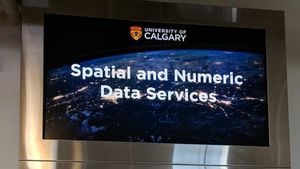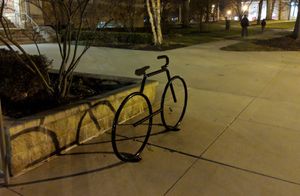In these pages a while ago I wrote about Wikipedia as an addressible knowledgebase: a part of its great attraction is that one can invoke elements of that knowledgebase with a URL. Jerry MacDonough made the reasonable point that one cannot rely on a URL to have a stable referent and goes on to say:
I’ve actually been thinking about this more in terms of how to do citation in papers which are discussing web resources, and I’m leaning more and more towards always including two URLs for a something I’m referencing: the original URL where I actually obtained the content, and a URL into the Internet Archive’s copy which was archived on a date as close as possible to the date on which I obtained the original. URLs into the Archive not only are likely to stay ‘live’ longer, but I can rely on the content’s fixity in a way that I can’t for any resource on the general web. [Lorcan Dempsey’s weblog: An addressable knowledge-base]
This touches on another post where I cite (the sadly deceased) Ross Atkinson’s suggestion that a library be responsible for assuring that an institutional web-page cited by a member of that institution remains accessible in the form it was in when cited. This would require some additional information in the citation, and some accepted trigger for action to be taken to take the relevant web-page into an appropriate curatorial environment. Of course, libraries and others could seek a collective solution for this issue, with the Internet Archive, or in some other way.
I was also at a meeting last week which discussed scenarios similar to the one I mentioned a while ago in relation to developments at Nature. Here there is a desire to have citations which are actionable – they may link to data for example.
I suggested a requirement here for ex-citability: one wants citations to be ‘live’, to be actionable, to be able to resolve to the referent. And increasingly, the referent will be itself dynamic or executable: a database, a web-page. Which raises the issue discussed above: how does one assure the stability of the referent. Of course, we don’t do this very well now.
But the integrity of citation is fundamental to scholarship, and we need better ways of addressing it.
I have mentioned the work of Peter Buneman in this regard, who oversees the research agenda at the Digital Curation Centre at the University of Edinburgh.
Keeping the past states of a database is an important part of the scholarly record. [What the web has done for scientific data – and what it hasn’t. Peter Buneman. [pdf]]
Some infrastructural issues in this regard are also being looked at in the interesting Pathways project at Cornell and LANL.
Incidentally, here is an interesting excerpt from a report of a Peter Buneman presentation:
The web is losing the scientific record as fast as it is creating it. [pv2005 conference report.doc – jiscstore – JotSpot]
Citation is a challenge where the scholarly record is created in a digital environment of variably changing, linked, executable resources is a challenge! What is the library role here?
Related entries:



